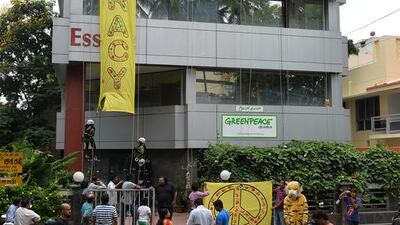NEW DELHI // Greenpeace in India is locked in a legal battle with the administration of prime minister Narendra Modi after his government froze the organisation’s funds.
The environmental group says it is struggling to stay operational past the end of this month and claim they are being targeted by Mr Modi.
"There has been a pattern of harassment by this government" ever since Mr Modi was sworn in as prime minister last May, Samit Aich, the executive director of Greenpeace India, told The National.
It comes as part of a wider government crackdown on NGOs that has drawn criticism from civil society as well as the diplomatic establishment.
“Civil society organisations in general and their support systems, including donors, are being labelled and targeted,” 70 non-profit groups said in an open letter to Mr Modi, released on May 4.
Although the letter acknowledged that transparency and accountability were important in the NGO sector, the government’s efforts to enforce this were “capricious, selective or based on flimsy grounds”, the groups said.
An intelligence bureau report, leaked to the media last June, advised the government that NGOs were “negatively impacting economic development” and that Greenpeace India in particular was “a threat to national economic security”.
The organisation had organised “massive efforts to take down India’s coal fired power plants and coal mining activity,” the report said.
With Greenpeace’s foreign currency account now frozen – through which it receives funds from Greenpeace International – as well as its four domestic accounts, the organisation does not have enough money to pay its 340 staff members after May 31, Mr Aich said last Thursday.
The accounts have been frozen since April 9 when the home ministry issued a four-page order listing several alleged inconsistencies in Greenpeace India’s account books, and instructing banks to block the organisation’s funds indefinitely.
Although Greenpeace replied to the order on May 7, clarifying the queries over its books, the group’s accounts remain blocked with no explanation offered by the ministry.
On Monday, the Delhi High Court agreed to hear the NGO’s legal challenge to the home ministry, setting May 26 as the first date of hearing.
But even that may be too late, said Mr Aich.
The government’s actions against Greenpeace appear to contradict Mr Modi’s drive towards a clean India.
But the prime minister’s administration was fixated on “being decisive, on making fast economic decisions, on the fact that development has to happen at whatever cost, and it has to happen in a particular way,” Mr Aich said. By campaigning for environmental consultations before the approval of power and mining projects, “we were just coming in their way.”
Mr Aich listed multiple incidents of alleged government harassment over the past year: three separate tax notices, sent out over the past year but all pertaining to previous assessment years; an unscheduled audit at Greenpeace’s office in Chennai last September; the government’s decision to offload a Greenpeace campaigner from her flight to London on a business trip; and a previous block, in June, of a tranche of 18.7 million rupees (Dh1.1m) from Greenpeace International, which was reversed by a Delhi High Court decision in January.
The January court decision noted that the government had not even notified Greenpeace of the block, or provided an explanation.
“First you freeze the account, then you investigate the case?” Justice Rajiv Shakdher chided the government in his decision.
In response to all of these incidents, Mr Aich said, “we sent them letters. I think I must have written to them 15 or 20 times, arguing why these actions were unjustified. But we never received a single response.”
In April, the home ministry cancelled the registrations of nearly 9,000 NGOs, with interests across the spectrum, that received some form of foreign funding. The ministry’s order stated that the NGOs had not filed their required annual returns for various years between 2009 and 2012.
That same month, the government announced that it had placed the Ford Foundation, a prominent private US foundation that makes grants to Indian NGOs, on a watch list.
Every batch of funds flowing into India via the Ford Foundation in the United States now has to be individually cleared by the home ministry, to ensure that the money is used for “bona fide welfare activities without compromising on concerns of national interest and security,” the ministry’s order said.
“Because a vibrant civil society is so important to both [India’s and the US’] democratic traditions, I do worry about the potentially chilling effects of these regulatory steps focused on NGOs,” Richard Verma, the US ambassador to India, said in a speech in New Delhi on May 6.
Mr Aich, meanwhile, said that his staff were committing themselves to the legal fight, and offering to work without pay for a few months.
“Of course, their resources aren’t unlimited, as individuals,” he said. “But we’ll figure out ways and means of operating as an organisation even after this.”
“Greenpeace certainly will not shut down in India, but we may have to look at a scaling down.”
SSubramanian@thenational.ae

